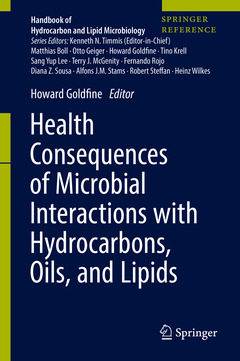Health Consequences of Microbial Interactions with Hydrocarbons, Oils, and Lipids, 1st ed. 2020 Handbook of Hydrocarbon and Lipid Microbiology Series
Coordonnateur : Goldfine Howard

Dr. Howard Goldfine received his B.S. degree from the City College of the City University of New York and his Ph.D. from the University of Chicago. After postdoctoral fellowships in the laboratories of Earl Stadtman at the NIH and Konrad Bloch at Harvard University, he joined the faculty of the Department of Microbiology and Immunology at Harvard Medical School. He moved to the University of Pennsylvania as an Associate Professor of Microbiology in the School of Medicine and subsequently was promoted to Full Professor. He has held a Macy Foundation Faculty Scholar Award, a Fogarty Senior International Fellowship, and a fellowship from the Japan Society for the Promotion of Science and has been a Visiting Professor at the University of Basel and University College London. He is President of the newly organized International Plasmalogen Society. In recognition of his research accomplishments he was elected a Fellow of the American Academy of Microbiology in 1988 and of the American Association for the Advancement of Science in 1998.
Dr. Goldfine has had a notable career in biochemistry and microbiology over the past half century. During this time he has made important contributions to our understanding of bacterial fatty acid and phospholipid biosynthesis, the assembly of the outer membranes of Gramnegative bacteria, the regulation of biophysical properties of bacterial membranes, and the structures, biosynthesis, and functions of bacterial ether lipids. In a second major phase of his research career his laboratory played a large role in elucidating the roles of phospholipases in bacterial pathogenesis with a focus on Listeria monocytogenes.
Explores key molecular mechanisms and cellular processes
Maximizes reader insights into infection metabolism
Sheds a light on lipids and lipid-protein interactions important for the development of bacterial and virus infections
Includes supplementary material: sn.pub/extras
Date de parution : 04-2020
Ouvrage de 493 p.
15.5x23.5 cm
Disponible chez l'éditeur (délai d'approvisionnement : 15 jours).
Prix indicatif 421,99 €
Ajouter au panier


